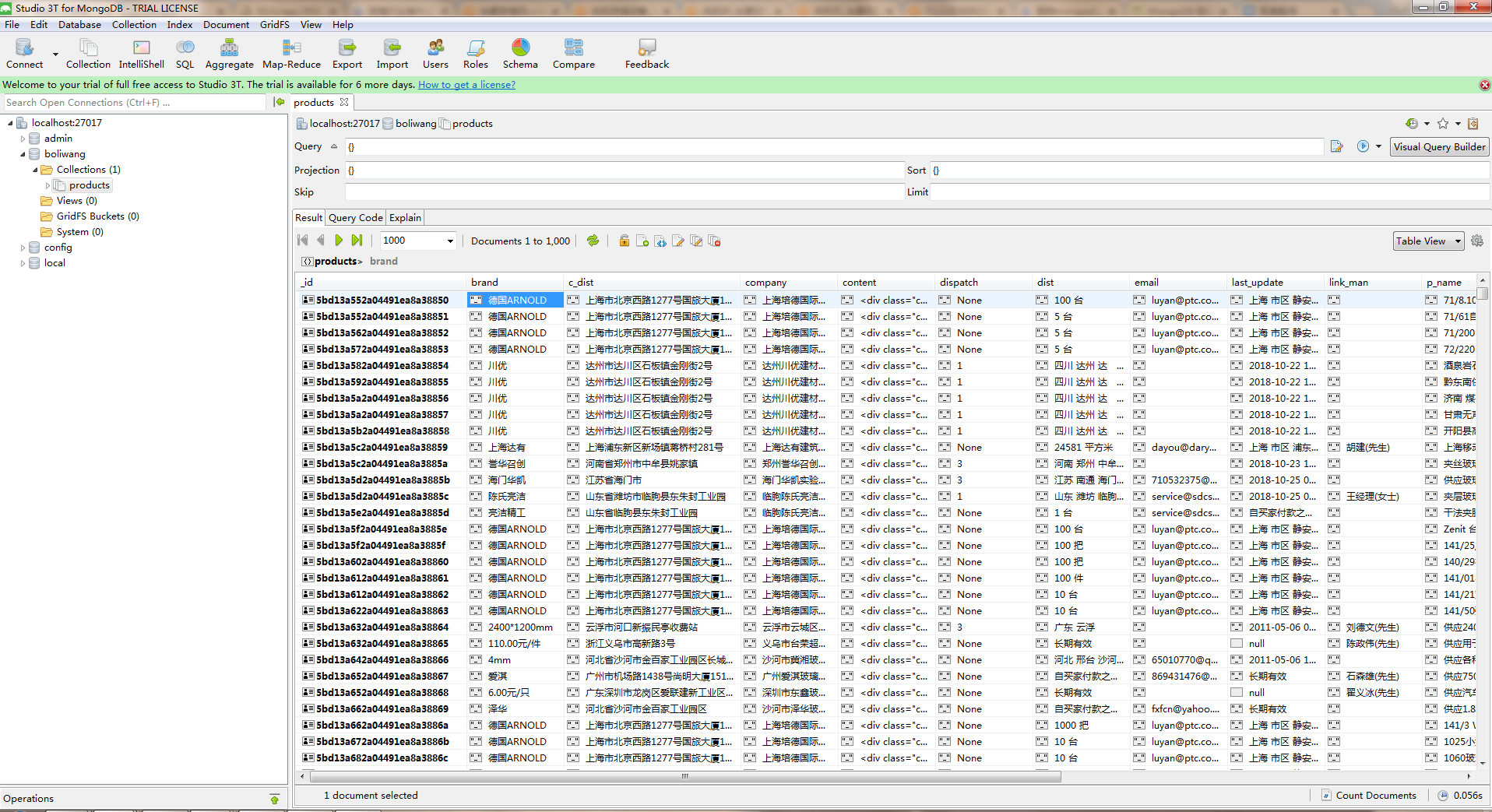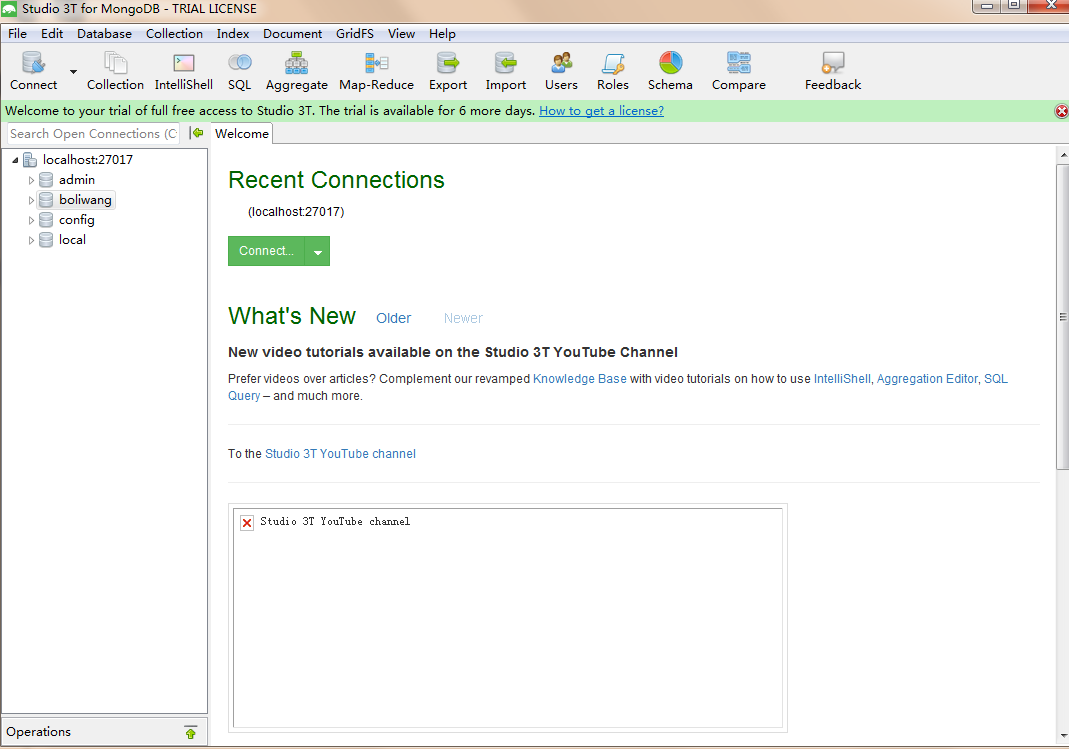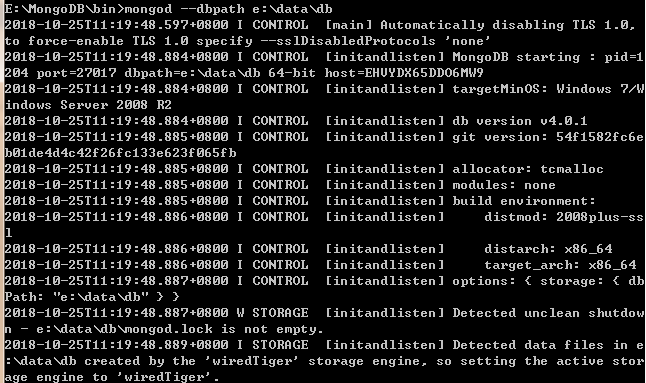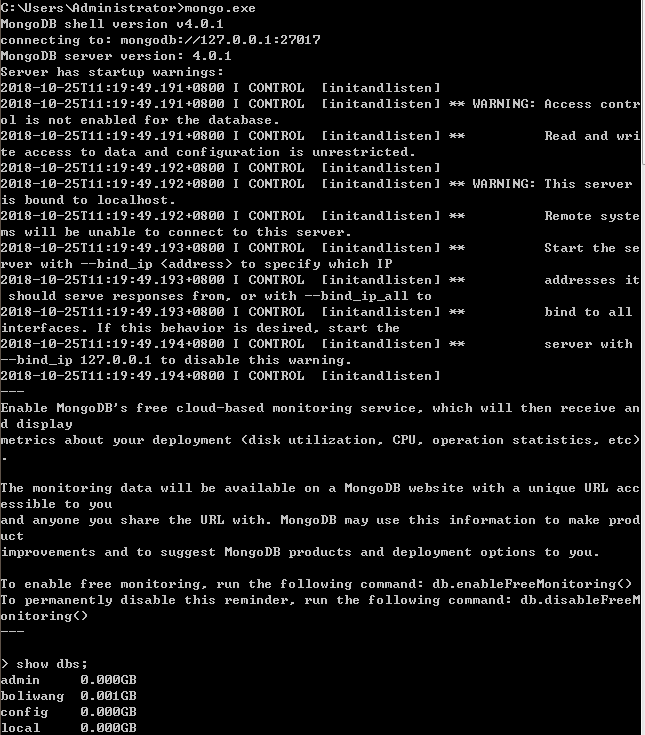42.scrapy爬取数据入库mongodb
scrapy爬虫采集数据存入mongodb
采集效果如图:

1.首先开启服务
切换到mongodb的bin目录下 命令:mongod --dbpath e:\data\db
另开黑窗口 命令:mongo.exe
2.连接可视化工具 studio—3t 建立本地连接
如图:

3.代码如下 采集的是玻璃网站产品数据 http://www.boliwang.com.cn/
boliwang.py # -*- coding: utf-8 -*-
import scrapy
import re
from boliwang_web.items import BoliwangWebItem class BoliwangSpider(scrapy.Spider):
name = 'boliwang'
allowed_domains = ['www.boliwang.com.cn']
start_urls = ['http://www.boliwang.com.cn/gy/index-htm-page-1.html']
custom_settings = {
'DOWNLOAD_DELAY': 0.5,
"DOWNLOADER_MIDDLEWARES": {
'boliwang_web.middlewares.BoliwangWebDownloaderMiddleware': 500,
},
}
def parse(self, response):
# print(response.text)
# 获取当前页面url
link_urls = response.xpath("//table//tr/td[4]/ul/li[1]/a/@href").extract() for link_url in link_urls:
# print(link_url)
yield scrapy.Request(url=link_url, callback=self.parse_detail)
# print('*'*100)
#翻页
tag = response.xpath("//div[@class='pages']/cite/text()").extract_first()
# print(tag)
p_num = tag.split('/')[1].replace('页','')
# print(p_num)
for i in range(1, int(p_num)+1):
url = 'http://www.boliwang.com.cn/gy/index-htm-page-{}.html'.format(i)
# print(url)
yield scrapy.Request(url=url, callback=self.parse) def parse_detail(self, response):
# 获取当前页面信息 item = BoliwangWebItem()
# 产品名称
p_name = response.xpath("//table//tr[1]/td/h1[@id='title']/text()").extract_first()
item['p_name'] = p_name
# 品牌
brand = response.xpath("//table//tr[2]/td[3]/table//tr[1]/td[2]/text()").extract_first()
item['brand'] = brand
# 单价
price = response.xpath("//table//tr[2]/td[@class='f_b f_orange']/text()").extract_first()
item['price'] = price
# 起订
set_up = response.xpath("//table//tr[3]/td[@class='f_b f_orange']/text()").extract_first()
item['set_up'] = set_up
# 供货总量
summation = response.xpath("//table//tr[4]/td[@class='f_b f_orange']/text()").extract_first()
item['summation'] = summation
# 发货期限
dispatch = response.xpath("//table//tr[5]/td[2]/span[@class='f_b f_orange']/text()").extract_first()
dispatch = '{}'.format(dispatch)
item['dispatch'] = dispatch
# 所在地区
dist = response.xpath("//table//tr[6]/td[2]/text()").extract_first()
item['dist'] = dist
# 有效期
term_of_valid = response.xpath("//table//tr[7]/td[2]/text()").extract_first()
item['term_of_valid'] = term_of_valid
# 最后更新
last_update = response.xpath("//table//tr[8]/td[2]/text()").extract_first()
item['last_update'] = last_update
# 详情信息
content = response.xpath("//div[@class='box_body']/div[@id='content']").extract_first()
item['content'] = content
# 公司名称
company = response.xpath("//li[@class='f_b t_c']/a/text()").extract_first()
item['company'] = company
# 联系人
try:
link_man = re.findall("<span>联系人</span>(.*?)  ", response.text)
link_man = link_man[0]
except:
link_man = ''
item['link_man'] = link_man
# 邮件
try:
email = re.findall('<li><span>邮件</span>(.*?)</li>', response.text)
email = email[0]
except:
email = ''
item['email'] = email
# 电话
try:
tel = re.findall('<li><span>电话</span>(.*?)</li>', response.text)
tel = tel[0]
except:
tel = ''
item['tel'] = tel
# 手机
try :
phone = re.findall('<li><span>手机</span>(.*?)</li>', response.text)
phone = phone[0]
except:
phone = ''
item['phone'] = phone
# 公司地址
try:
c_dist = re.findall('<span>地址</span>(.*?)</li></ul>',response.text)
c_dist = c_dist[0]
except:
c_dist = ''
item['c_dist'] = c_dist yield item print('*'*100)
items.py # -*- coding: utf-8 -*- # Define here the models for your scraped items
#
# See documentation in:
# https://doc.scrapy.org/en/latest/topics/items.html import scrapy class BoliwangWebItem(scrapy.Item):
# define the fields for your item here like:
# name = scrapy.Field() collection = table = 'products' # 产品名称
p_name = scrapy.Field()
# 品牌
brand = scrapy.Field()
# 单价
price = scrapy.Field()
# 起订
set_up = scrapy.Field()
# 供货总量
summation = scrapy.Field()
# 发货期限
dispatch = scrapy.Field()
# 所在地区
dist = scrapy.Field()
# 有效期
term_of_valid = scrapy.Field()
# 最后更新
last_update = scrapy.Field()
# 详情信息
content = scrapy.Field()
# 公司名称
company = scrapy.Field()
# 联系人
link_man = scrapy.Field()
# 邮件
email = scrapy.Field()
# 电话
tel = scrapy.Field()
# 手机
phone = scrapy.Field()
# 公司地址
c_dist = scrapy.Field()
items.py # -*- coding: utf-8 -*- # Define here the models for your spider middleware
#
# See documentation in:
# https://doc.scrapy.org/en/latest/topics/spider-middleware.html from scrapy import signals class BoliwangWebSpiderMiddleware(object):
# Not all methods need to be defined. If a method is not defined,
# scrapy acts as if the spider middleware does not modify the
# passed objects. @classmethod
def from_crawler(cls, crawler):
# This method is used by Scrapy to create your spiders.
s = cls()
crawler.signals.connect(s.spider_opened, signal=signals.spider_opened)
return s def process_spider_input(self, response, spider):
# Called for each response that goes through the spider
# middleware and into the spider. # Should return None or raise an exception.
return None def process_spider_output(self, response, result, spider):
# Called with the results returned from the Spider, after
# it has processed the response. # Must return an iterable of Request, dict or Item objects.
for i in result:
yield i def process_spider_exception(self, response, exception, spider):
# Called when a spider or process_spider_input() method
# (from other spider middleware) raises an exception. # Should return either None or an iterable of Response, dict
# or Item objects.
pass def process_start_requests(self, start_requests, spider):
# Called with the start requests of the spider, and works
# similarly to the process_spider_output() method, except
# that it doesn’t have a response associated. # Must return only requests (not items).
for r in start_requests:
yield r def spider_opened(self, spider):
spider.logger.info('Spider opened: %s' % spider.name) class BoliwangWebDownloaderMiddleware(object):
# Not all methods need to be defined. If a method is not defined,
# scrapy acts as if the downloader middleware does not modify the
# passed objects. @classmethod
def from_crawler(cls, crawler):
# This method is used by Scrapy to create your spiders.
s = cls()
crawler.signals.connect(s.spider_opened, signal=signals.spider_opened)
return s def process_request(self, request, spider):
# Called for each request that goes through the downloader
# middleware. # Must either:
# - return None: continue processing this request
# - or return a Response object
# - or return a Request object
# - or raise IgnoreRequest: process_exception() methods of
# installed downloader middleware will be called
return None def process_response(self, request, response, spider):
# Called with the response returned from the downloader. # Must either;
# - return a Response object
# - return a Request object
# - or raise IgnoreRequest
return response def process_exception(self, request, exception, spider):
# Called when a download handler or a process_request()
# (from other downloader middleware) raises an exception. # Must either:
# - return None: continue processing this exception
# - return a Response object: stops process_exception() chain
# - return a Request object: stops process_exception() chain
pass def spider_opened(self, spider):
spider.logger.info('Spider opened: %s' % spider.name)
piplines.py # -*- coding: utf-8 -*- # Define your item pipelines here
#
# Don't forget to add your pipeline to the ITEM_PIPELINES setting
# See: https://doc.scrapy.org/en/latest/topics/item-pipeline.html
import pymongo class BoliwangWebPipeline(object):
def process_item(self, item, spider):
return item class MongoPipeline(object):
def __init__(self, mongo_uri, mongo_db):
self.mongo_uri = mongo_uri
self.mongo_db = mongo_db @classmethod
def from_crawler(cls, crawler):
return cls(mongo_uri=crawler.settings.get('MONGO_URI'), mongo_db=crawler.settings.get('MONGO_DB')) def open_spider(self, spider):
self.client = pymongo.MongoClient(self.mongo_uri)
self.db = self.client[self.mongo_db] def process_item(self, item, spider):
self.db[item.collection].insert(dict(item))
return item def close_spider(self, spider):
self.client.close()
settinngs.py # -*- coding: utf-8 -*- # Scrapy settings for boliwang_web project
#
# For simplicity, this file contains only settings considered important or
# commonly used. You can find more settings consulting the documentation:
#
# https://doc.scrapy.org/en/latest/topics/settings.html
# https://doc.scrapy.org/en/latest/topics/downloader-middleware.html
# https://doc.scrapy.org/en/latest/topics/spider-middleware.html BOT_NAME = 'boliwang_web' SPIDER_MODULES = ['boliwang_web.spiders']
NEWSPIDER_MODULE = 'boliwang_web.spiders' # Crawl responsibly by identifying yourself (and your website) on the user-agent
#USER_AGENT = 'boliwang_web (+http://www.yourdomain.com)' # Obey robots.txt rules
ROBOTSTXT_OBEY = False MONGO_HOST = "localhost"
MONGO_PORT = 27017
MONGO_DB = 'boliwang' # Configure maximum concurrent requests performed by Scrapy (default: 16)
#CONCURRENT_REQUESTS = 32 # Configure a delay for requests for the same website (default: 0)
# See https://doc.scrapy.org/en/latest/topics/settings.html#download-delay
# See also autothrottle settings and docs
#DOWNLOAD_DELAY = 3
# The download delay setting will honor only one of:
#CONCURRENT_REQUESTS_PER_DOMAIN = 16
#CONCURRENT_REQUESTS_PER_IP = 16 # Disable cookies (enabled by default)
#COOKIES_ENABLED = False # Disable Telnet Console (enabled by default)
#TELNETCONSOLE_ENABLED = False # Override the default request headers:
#DEFAULT_REQUEST_HEADERS = {
# 'Accept': 'text/html,application/xhtml+xml,application/xml;q=0.9,*/*;q=0.8',
# 'Accept-Language': 'en',
#} # Enable or disable spider middlewares
# See https://doc.scrapy.org/en/latest/topics/spider-middleware.html
#SPIDER_MIDDLEWARES = {
# 'boliwang_web.middlewares.BoliwangWebSpiderMiddleware': 543,
#} # Enable or disable downloader middlewares
# See https://doc.scrapy.org/en/latest/topics/downloader-middleware.html
DOWNLOADER_MIDDLEWARES = {
'boliwang_web.middlewares.BoliwangWebDownloaderMiddleware': 543,
} # Enable or disable extensions
# See https://doc.scrapy.org/en/latest/topics/extensions.html
#EXTENSIONS = {
# 'scrapy.extensions.telnet.TelnetConsole': None,
#} # Configure item pipelines
# See https://doc.scrapy.org/en/latest/topics/item-pipeline.html
ITEM_PIPELINES = {
'boliwang_web.pipelines.MongoPipeline': 300,
} # Enable and configure the AutoThrottle extension (disabled by default)
# See https://doc.scrapy.org/en/latest/topics/autothrottle.html
#AUTOTHROTTLE_ENABLED = True
# The initial download delay
#AUTOTHROTTLE_START_DELAY = 5
# The maximum download delay to be set in case of high latencies
#AUTOTHROTTLE_MAX_DELAY = 60
# The average number of requests Scrapy should be sending in parallel to
# each remote server
#AUTOTHROTTLE_TARGET_CONCURRENCY = 1.0
# Enable showing throttling stats for every response received:
#AUTOTHROTTLE_DEBUG = False # Enable and configure HTTP caching (disabled by default)
# See https://doc.scrapy.org/en/latest/topics/downloader-middleware.html#httpcache-middleware-settings
#HTTPCACHE_ENABLED = True
#HTTPCACHE_EXPIRATION_SECS = 0
#HTTPCACHE_DIR = 'httpcache'
#HTTPCACHE_IGNORE_HTTP_CODES = []
#HTTPCACHE_STORAGE = 'scrapy.extensions.httpcache.FilesystemCacheStorage'
42.scrapy爬取数据入库mongodb的更多相关文章
- 如何提升scrapy爬取数据的效率
在配置文件中修改相关参数: 增加并发 默认的scrapy开启的并发线程为32个,可以适当的进行增加,再配置文件中修改CONCURRENT_REQUESTS = 100值为100,并发设置成了为100. ...
- scrapy爬取数据的基本流程及url地址拼接
说明:初学者,整理后方便能及时完善,冗余之处请多提建议,感谢! 了解内容: Scrapy :抓取数据的爬虫框架 异步与非阻塞的区别 异步:指的是整个过程,中间如果是非阻塞的,那就是异步 ...
- 将scrapy爬取数据通过django入到SQLite数据库
1. 在django项目根目录位置创建scrapy项目,django_12是django项目,ABCkg是scrapy爬虫项目,app1是django的子应用 2.在Scrapy的settings.p ...
- python之scrapy爬取数据保存到mysql数据库
1.创建工程 scrapy startproject tencent 2.创建项目 scrapy genspider mahuateng 3.既然保存到数据库,自然要安装pymsql pip inst ...
- scrapy爬取数据保存csv、mysql、mongodb、json
目录 前言 Items Pipelines 前言 用Scrapy进行数据的保存进行一个常用的方法进行解析 Items item 是我们保存数据的容器,其类似于 python 中的字典.使用 item ...
- scrapy爬取数据进行数据库存储和本地存储
今天记录下scrapy将数据存储到本地和数据库中,不是不会写,因为小编每次都写觉得都一样,所以记录下,以后直接用就可以了-^o^- 1.本地存储 设置pipel ines.py class Ak17P ...
- Python 爬取数据入库mysql
# -*- enconding:etf-8 -*- import pymysql import os import time import re serveraddr="localhost& ...
- Python使用Scrapy框架爬取数据存入CSV文件(Python爬虫实战4)
1. Scrapy框架 Scrapy是python下实现爬虫功能的框架,能够将数据解析.数据处理.数据存储合为一体功能的爬虫框架. 2. Scrapy安装 1. 安装依赖包 yum install g ...
- 爬虫必知必会(6)_提升scrapy框架爬取数据的效率之配置篇
如何提升scrapy爬取数据的效率:只需要将如下五个步骤配置在配置文件中即可 增加并发:默认scrapy开启的并发线程为32个,可以适当进行增加.在settings配置文件中修改CONCURRENT_ ...
随机推荐
- Excel技巧--分类求和与空白批量填充
分类求和: 当我们要对以上多个分类空白求和时,可以巧用Alt+=键: 1.选择对应要求和的列: 2.点击“查找与选择”下拉列,选择“定位条件”,对话框选择“空值”,点确定.将列中的空白单元格选好: 3 ...
- 写了一个hiero检查任务渲染结果的脚本
基本思路是写了一个时间判断函数(postSequence_check)来对比transcode任务提交时间和目标文件夹内文件的修改时间来确定渲染是否成功执行,然后通过Hiero提供的postSeque ...
- Task Class
https://docs.microsoft.com/zh-cn/dotnet/api/system.threading.tasks.task?redirectedfrom=MSDN&view ...
- VS中的类模板
在目录C:\Program Files (x86)\Microsoft Visual Studio\2017\Community\Common7\IDE\ItemTemplates\CSharp\Co ...
- DS树+图综合练习--二叉树之最大路径
题目描述 给定一颗二叉树的逻辑结构(先序遍历的结果,空树用字符‘0’表示,例如AB0C00D00),建立该二叉树的二叉链式存储结构 二叉树的每个结点都有一个权值,从根结点到每个叶子结点将形成一条路径, ...
- 【mysql】ICP下mysql执行计划的一次解析
mysql版本 [root@xxxx]# mysql --version mysql Ver 15.1 Distrib 5.5.52-MariaDB, for Linux (x86_64) using ...
- 【Java】Java初始化过程总结
概述 Java字节代码:byte[] Java类在JVM的表现形式:Class类的对象: Java源代码被编译成class字节码 : Java字节代码 --> Class类的对象: 加载:把Ja ...
- Ubuntu 14.10 下安装伪分布式hive-0.14.0
本地独立模式,MySQL作为元数据库 1 安装环境准备 1.1 安装JDK,在安装hadoop时候已经安装了,参考http://www.cnblogs.com/liuchangchun/p/40972 ...
- HTTP之Cookie
cookie是什么 浏览器存储在本地电脑上的一小段文本文件,cookie的存在主要是为了解决http协议无状态的问题,例如通过cookie来判断用户的登录状态,是否是某一个用户等. cookie的结构 ...
- event.currentTarget指向事件所绑定的元素,而event.target始终指向事件发生时的元素
event.currentTarget指向事件所绑定的元素,而event.target始终指向事件发生时的元素


